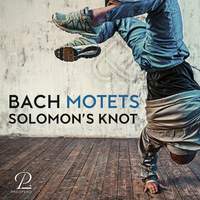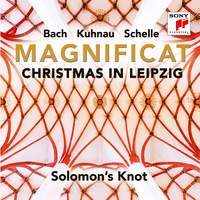Interview,
Jonathan Sells on motets by two Bachs

Not only does this new album from Solomon's Knot explore the links between JS Bach's six great motets and those of Johann Christoph (representing an earlier generation of the illustrious Bach dynasty, and one that Johann Sebastian himself regarded particularly highly); not only are they performed from memory, removing a potential barrier between director and singers; but they're also recorded in the hallowed aisles of the Bachkirche in Arnstadt, where Johann Christoph was born and where Johann Sebastian had his first organist position.
It's thus an album that's about as steeped in the spirit of these two Bachs as it's possible to be, and as artistic director Jonathan Sells points out, it might recapture almost exactly the circumstances of some of these works' first performances. Jonathan explains more on that below, and shares some other thoughts on the way the Bach family, over the generations, helped to drive sacred vocal music in new and unprecedented directions.
Bach’s slightly older contemporary Friedrich Niedt dismissed motets as simple and dated music for provincial peasants. Was he an outlier in holding this view - or did something have to shift in order for Bach to be able to treat motets as complex, serious, virtuosic music?
Firstly it’s worth saying that Niedt’s reductive statement does a disservice to hundreds of years of beautiful and often complex music. But the sentiment behind it implies that this was a dead genre, not something fitting for modern tastes and times. And although some of JS Bach’s motets have been lost, its immediately apparent that this was a genre much less called-for in terms of new music in the first half of the 18th-century: here, the cantata was king. The prima prattica motet of previous centuries was by no means forgotten, however, as it remained a fixed component of liturgical music throughout this period. In the context of these older pieces, and even of the double-choir works of the previous generation of Bachs which obviously made an impression on Johann Sebastian, it is he himself who is the outlier.
Far from attempting a pastiche and remaining within the old style, he treats the motet as an opportunity to boil down his ‘concerted’ writing (that is complex, virtuoso music accompanied by instruments) into pure vocal form, creating the effect of multiple ‘choirs’, that he achieves with vocal and instrumental groupings in the cantatas and oratorios, with only eight vocal parts (whether or not doubled by instruments). This is highly modern, and more audaciously complex than anything attempted by any of his contemporaries. And yet, as always with Bach, an astonishing humanity and spirituality shines through the fractal-like intricacy.
Johann Sebastian Bach’s own high opinion of his ancestor Johann Christoph is clear, both in his writings and in his decision to programme his music. Did broader musical society at the time share this regard for the elder Bach’s talents, or was it more of a personal interest?
You’d have to ask a proper music historian for a better answer on this! But I would say that this was a period where music was mostly written for present need, and it was rare that older pieces were kept for posterity or performed repeatedly over the years. It’s easier to think of it in terms of the pop music of today - though of course we now have recordings which preserve the past. But the aesthetic of, say, the 1980s or 1990s is not necessarily something that it would be popular to reproduce now, and musical taste had moved on in a similar way in the 1720s. In order to be kept, such music had to be copied by hand, and paper was a precious commodity. Knowing that he came from such an illustrious musical dynasty, JS Bach was more aware than most of legacy and his place in history. This is why he curated the Alt-Bach’sches Archiv and preserved many works by his elders, and it was above all within the Bach family itself that Johann Christoph was so highly regarded. In turn, towards the end of his life, Sebastian was all the more aware of his own place in that lineage, and the future fate of his best works.
Johann Sebastian and Johann Christoph are representatives of a much broader musical dynasty - why did you focus in on just these two composers within the family?
It struck me very strongly that Sebastian had deliberately prepared and performed some of JC Bach’s motets in the final decade of his life. Some scholars say he may even have intended ‘Lieber Herr Gott, wecke uns auf’ to be performed at his own funeral. That is an intense personal connection which goes far beyond questions of style and interesting similarities such as his continuation of the Thüringian motet technique. We have performed a fair amount of excellent music by Johann Michael Bach, Christoph’s brother, but this intimate link and the fact that Sebastian singled Christoph out as the ‘profound’ and ‘expressive’ composer seemed reason enough to keep them as a pair.
And the reason we wanted to include all of Johann Sebastian’s motets? For us, as a group they represent one of the greatest examples of what vocal music can achieve.
The level of virtuosity in the six motets’ vocal parts is just so striking - particularly when juxtaposed with the writing of Johann Christoph. What do you think led Johann Sebastian to raise the bar? Were there any earlier ambitious works that might have inspired him, or changes in the calibre of musicians he had access to?
The question about the musicians is a fascinating one which we will never be able to definitively answer. But it is certain that he pushed whatever musicians he had to the limit. If Bach’s music is still considered today as some of the most virtuosic, then it must have been 300 years ago too. The virtuosity and contrapuntal complexity is something which pervades almost all of his music and seems to come from somewhere unique to Bach himself. He had a brain which could play these simultaneous musical chess matches in his head, and he wanted to turn them into sounding reality, in whatever genre or with whatever instruments or voices that were called for.
If one believes, as I do, that ‘Lobet den Herrn’ is an early work by JS Bach, perhaps even from the Arnstadt years, then one can see something of a increase in complexity from that work to the other motets, not only in the doubling of the number of vocal parts, but also from the very touching but simpler central section, ‘denn seine Gnade’. But this is all relative - the motet’s opening develops into a double fugue, and the work ends with the most thrilling and filigree ‘Alleluia’, which is fit for more than just ‘provincial peasants’!
You perform these motets largely with one voice to a part; do you feel strongly about the merits of this approach, compared to a larger ensemble of say sixteen or twenty-four singers?
Can of worms alert! In short, yes. There are a number of different factors here. We always work without a conductor, as chamber musicians, and a larger group makes this more difficult. With music of this complexity, the supreme flexibility offered by single voices means that one can reach an high level of nuance and inflection which I find very satisfying musically. Apart from the fact that I interpret Bach’s demands for a minimum number of musicians as implying that his most complex music would have been performed with one or two voices per part, I also just think it works better - if you have the right calibre of singers available.
Of course, this is just my taste, and is never meant to imply that other approaches are not viable - Bach should be performed by as many people, and in as many different ways as possible! His music is there for everyone to enjoy.
As well as being a predominantly single-voice ensemble, one thing that distinguishes Solomon’s Knot is that you perform from memory. How did you approach the task of memorising all six of these complex and intricate motets (never mind the Johann Christoph ones interspersed between them)?
Our singers always memorise, and instrumental soloists often too. I can honestly tell you that it was one of the very hardest things we have done, of over 20 memorised programmes. All of us memorise in quite different ways and need different amounts of time to do it. The learning takes place individually and is simply reinforced in rehearsal. I don’t think we rehearse more than we would if we hadn’t memorised. I have strong memories of endless Bach Motet Karaoke late at night over an ironing board!
In addition to and in combination with the small forces and chamber music approach, group memorisation is something incredibly liberating and empowering in rehearsal and performance. The ability to focus so much more on one’s colleagues, to participate most wholly in the musical happening, to be utterly present and in Flow, is an invaluable gift that we give each other by going through the rather gruelling preparation process. It more than repays the effort - for our audience as well as ourselves.
Solomon's Knot
Available Formats: 2 CDs, MP3, FLAC, Hi-Res FLAC
Magnificat - Christmas in Leipzig
Tracing Christmas celebrations at Leipzig's Thomaskirche from Kuhnau, via Schelle, to JS Bach
Solomon's Knot
Available Formats: CD, MP3, FLAC, Hi-Res FLAC




